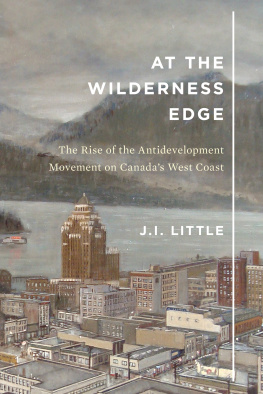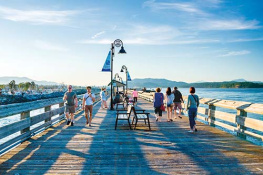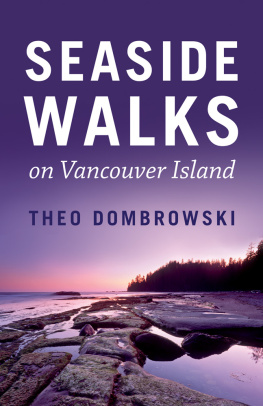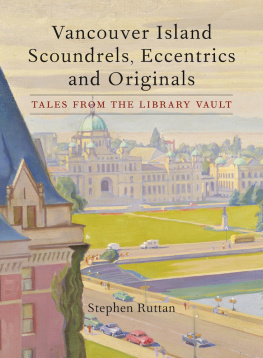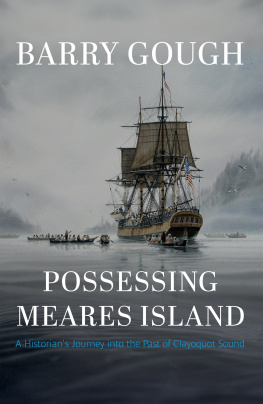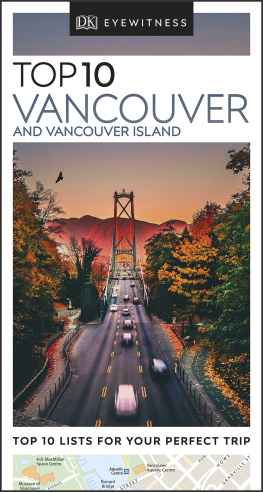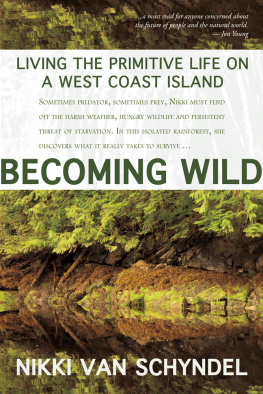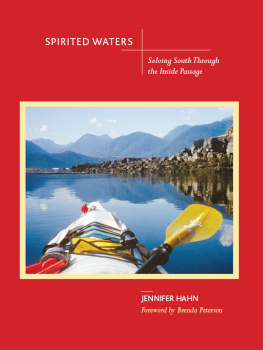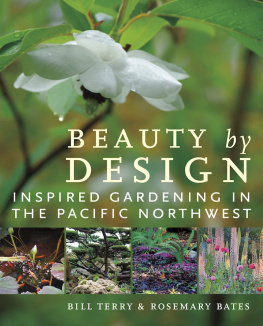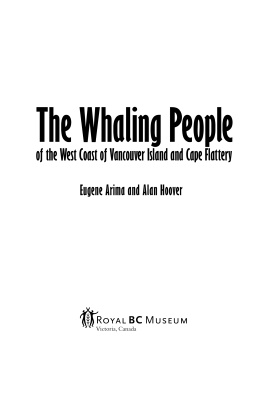
AT THE
WILDERNESS
EDGE
McGill-Queens Rural, Wildland, and Resource Studies Series
SERIES EDITORS: Colin A.M. Duncan, James Murton, and R.W. Sandwell
The Rural, Wildland, and Resource Studies Series includes monographs, thematically unified edited collections, and rare out-of-print classics. It is inspired by Canadian Papers in Rural History, Donald H. Akensons influential occasional papers series, and seeks to catalyze reconsideration of communities and places lying beyond city limits, outside centres of urban political and cultural power, and located at past and present sites of resource procurement and environmental change. Scholarly and popular interest in the environment, climate change, food, and a seemingly deepening divide between city and country, is drawing non-urban places back into the mainstream. The series seeks to present the best environmentally contextualized research on topics such as agriculture, cottage living, fishing, the gathering of wild foods, mining, power generation, and rural commerce, within and beyond Canadas borders.
1 How Agriculture Made Canada Farming in the Nineteenth Century
Peter A. Russell
2 The Once and Future Great Lakes Country An Ecological History
John L. Riley
3 Consumers in the Bush Shopping in Rural Upper Canada
Douglas McCalla
4 Subsistence under Capitalism Nature and Economy in Historical and Contemporary Perspectives
Edited by James Murton, Dean Bavington, and Carly Dokis
5 Time and a Place An Environmental History of Prince Edward Island
Edited by Edward MacDonald, Joshua MacFadyen, and Iren Novaczek
6 Powering Up Canada A History of Power, Fuel, and Energy from 1600
Edited by R. W. Sandwell
7 Permanent Weekend Nature, Leisure, and Rural Gentrification
John Michels
8 Nature, Place, and Story Rethinking Historic Sites in Canada
Claire Elizabeth Campbell
9 The Subjugation of Canadian Wildlife Failures of Principle and Policy
Max Foran
10 Flax Americana A History of the Fibre and Oil That Covered a Continent
Joshua MacFadyen
11 At the Wilderness Edge The Rise of the Antidevelopment Movement on Canadas West Coast
J.I. Little
AT THE
WILDERNESS
EDGE
The Rise of the Antidevelopment Movement on Canadas West Coast
J.I. LITTLE
McGill-Queens University Press
Montreal & Kingston London Chicago
McGill-Queens University Press 2019
ISBN 978-0-7735-5630-0 (cloth)
ISBN 978-0-7735-5640-9 (paper)
ISBN 978-0-7735-5646-1 (ePDF)
ISBN 978-0-7735-5647-8 (ePUB)
Legal deposit first quarter 2019
Bibliothque nationale du Qubec
Printed in Canada on acid-free paper that is 100% ancient forest free (100% post-consumer recycled), processed chlorine free
This book has been published with the help of a grant from the Canadian Federation for the Humanities and Social Sciences, through the Awards to Scholarly Publications Program, using funds provided by the Social Sciences and Humanities Research Council of Canada.
We acknowledge the support of the Canada Council for the Arts, which last year invested $153 million to bring the arts to Canadians throughout the country.
Nous remercions le Conseil des arts du Canada de son soutien. Lan dernier, le Conseil a investi 153 millions de dollars pour mettre de lart dans la vie des Canadiennes et des Canadiens de tout le pays.
Library and Archives Canada Cataloguing in Publication
Little, J. I. (John Irvine), 1947, author
At the wilderness edge : the rise of the antidevelopment movement on Canadas West Coast / J.I. Little.
(McGill-Queens rural, wildland, and resource studies series ; 11)
Includes bibliographical references and index.
Issued in print and electronic formats.
ISBN 978-0-7735-5630-0 (cloth).ISBN 978-0-7735-5640-9 (paper).ISBN 978-0-7735-5646-1 (ePDF).ISBN 978-0-7735-5647-8 (ePUB)
1. Protest movements British Columbia. 2. Green movement British Columbia. 3. Economic development Social aspects British Columbia. I. Title. II. Series: McGill-Queens rural, wildland, and resource studies series ; 11
HM883.L58 2019 | 303.48'409711 | C2018-905124-8 |
C2018-905125-6 |
Contents
Figures
Acknowledgments
I wish to thank series coeditor Ruth Sandwell for encouraging me to submit the manuscript for publication in the Rural, Wildland, and Resource Studies series. I have been inspired by her enthusiasm for rural history over the years since she was my doctoral student at Simon Fraser University. I also want to thank McGill-Queens editor Kyla Madden for shepherding the book so smoothly and expeditiously through the publication process and particularly for taking the care to select two exceptionally helpful anonymous readers, whom I hereby thank as well. Coeditors Kathleen Fraser and Finn Purcell and copy editor Shelagh Plunkett were also a pleasure to work with. And a special thanks is due to my student research assistant Alice Huang, who was not only very skilled at digging up sources but also methodical in organizing them and timely in presenting them.
Most of the sources for this research project were found in local archives collections collections that include news clippings as well as the fonds of community-based organizations. Particularly helpful were Catherine Bayly at the Bowen Island Museum and Archives, and the staff at the City of Vancouver Archives, the West Vancouver Archives, the Vancouver Public Library, and the BC Legislative Library. Vancouver historian Bob McDonald cast his critical eye on my main arguments, Ben Bradley was my go-to guy for sources on parks and tourism, Eryk Martin pointed to studies on the BC environmental movement, and Sean Kheraj informed me about the sources for the Harbour Park protests. Aateka Shashank produced the Howe Sound and Harbour Park maps, and Ben Frey the one for Gambier Island. On Bowen Island, my neighbour and friend Richard Smith provided expert computer assistance as well as serving as a sounding post during our weekend dog walks. Also on the island, Katherine Gish provided access to the Tunstall Bay Community Association Archives and Eric Sherlock persuaded me to join the board of Bowen Eco-Alliance, thereby sparking my interest in the historical background to the campaigns we were engaged in. A young Bowen eco-warrior, himself, during the 1970s, John Rich kindly consented to an interview as well as providing access to his extensive file of documents, which are now deposited in the Bowen Island Archives. In addition, environmental activist John Buchanan of Squamish sent me very useful research material on Howe Sound, and Elspeth Armstrong of Hornby Island responded to my questions about her leading role in the Gambier Island protest. Rafe Mair, who was provincial environment minister at the time, and Doug Morrison of Squamish also kindly responded to my inquiries. In addition, I wish to thank Bowen Islanders Will Husby, Sue Ellen Fast, and Bob Turner for their interest and support, and to dedicate this book to the Howe Sound environmental activists who, like them, work tirelessly for the benefit of their communities and future generations. Finally, essential to the production of this book was research funding from the Social Sciences and Humanities Research Council of Canada, but my greatest debt goes, once again, to my wife Andrea for providing the love and support that keeps me going.
Next page
